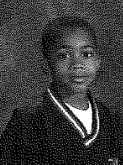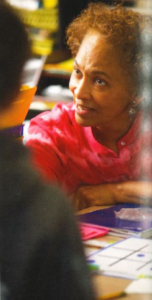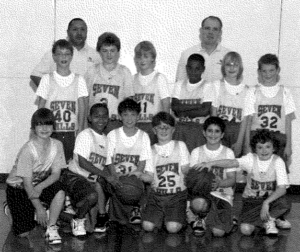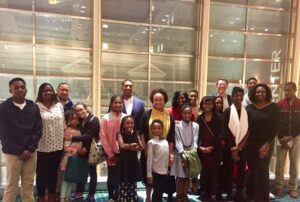Theo Nelson
Before our three sons T.J., Jared, and Joshua had come along, my niece, Brittany Nelson-Turner, attended Seven Hills. My sister was a single mom, and she would sometimes ask me to drop Brittany off or pick her up or participate in school events, so I was on campus before our boys ever attended the school. Seeing Brittany evolve into this incredibly smart young lady, I’d always go back to my wife Doris and say, “Hey, this seems like a really awesome place.” If it weren’t for Brittany, Seven Hills wouldn’t have been on our radar. That exposure was key.

Our oldest, T.J., started in first grade at Doherty in 2000. Doherty teacher Regina Daily was one of the only African American teachers there, and she really helped us make the final decision. She was transparent, and said, “Listen, they’re small classes, and he may be the only African American student in the class. Be prepared for that.” What she was really saying was that she’d look out for him. She reassured us that he wouldn’t be treated differently. We were impressed that she went beyond what was expected of a faculty member to share that with us.

All three of our boys had been exposed to an early childhood reading program. When they were 4- or 5-years-old, they were already reading first and second grade books. So, coming to Seven Hills, they were equipped and ready. Doris and I remember Doherty librarian Mrs. Wolfe creating an advanced reading group that they were part of. The teachers were empowered to do things like that. We thought, This is the reason we’re here. The teachers see; they care.
I wanted to make sure I was involved, so I did a lot of coaching during the ages when the school still let the parents coach. I loved the events and occasions where the other parents and I could wear our Seven Hills apparel — a hat or a T-shirt or a sweatshirt. We weren’t doing it to boast or brag or be prideful, it was just a unity thing. I remember attending an event at the school, and Middle School Alethic Director Roger Schnirring saw me in some piece of gear and was like, “You still have that?” I’ve got some throwbacks, man. Not long ago, I was in my closet saying, I really need to move on and put this stuff in boxes. Those times coaching and bonding with other parents were good days.

I loved that it wasn’t just the parents you’d form relationships with, it was also the teachers. Even though my boys have all graduated, I will still get a text from Nick Francis saying, “Happy Father’s Day.” Nick was Joshua’s soccer coach for three years. He instilled in him the attitude of never giving up and being willing to try different things. Joshua had played forward and been offensive-minded for his entire soccer career, but Nick asked him to play defense. Joshua didn’t want to do it, but Nick saw something in him that I didn’t see and no one else saw. Joshua ended up being defensive first team all-conference, all-city, all-state, and all-region. Nick even drove an hour and a half up to Columbus for the all-state awards banquet. That says a lot.
We were always upfront and transparent with our boys about what it cost to go to Seven Hills. We would sit down with them and show them the numbers, even at an early age, so that they would appreciate and value the education.

In December of 2001, I was selected to shoot a shot from halfcourt during halftime at the Crosstown Shootout between UC and Xavier. The prize, if I made it, was a million dollars. The ball left my hands and God did the rest. Miraculously, it went in. That couldn’t have come at a better time. Our youngest had just been born three months earlier, and Doris and I had been thinking, can we really afford to send two kids to Seven Hills, let alone three? We wanted Joshua to follow in his brothers’ footsteps, but it didn’t look good. We later told our boys, the money from making that shot is being applied towards this tuition bill.
 After the shot, there were different media interviews and former Athletic Director Brian Phelps let me do one in the Seven Hills gym. The TV reporter asked, “What are you doing with the money?” I said, “You’re looking at it. This is where we’ve put the investment — and it’s paying off.” Ultimately, all three of our boys went through Seven Hills and received college scholarships. That is return on investment.
After the shot, there were different media interviews and former Athletic Director Brian Phelps let me do one in the Seven Hills gym. The TV reporter asked, “What are you doing with the money?” I said, “You’re looking at it. This is where we’ve put the investment — and it’s paying off.” Ultimately, all three of our boys went through Seven Hills and received college scholarships. That is return on investment.

Our boys received a lot of spiritual enrichment at home and outside the school, but they also liked that because Seven Hills wasn’t a religious school. They had relationships with Muslim families and Hindu families and could learn firsthand that this is what your faith and culture are all about.
Each year we were at the school, I also felt like there was an increase in families of color. I’m encouraged by that. It’s so important to have that representation — from a student standpoint, from a faculty standpoint, from a Board standpoint. It says to other schools and to the city, we’re doing it, we’re not just talking. With everything going on in the country, it’s important that Seven Hills isn’t hiding or shying away from issues of race and diversity.
In 2020 and 2021, I was involved with the Upper School English department as they worked through a reading guide called “Courageous Conversations About Race.” Nate Gleiner always made his classroom available. A few other parents of color and I would meet with faculty members throughout the year. We’d take turns moderating and doing these exercises, and the focus was on embracing the discomfort that comes from honestly talking about the injustices that pervade our society. For all of us who attended, including Chris Garten, it allowed us to look in the mirror.
I think the willingness to have those hard conversations is part of what separates Seven Hills from other schools. If you have a diversity statement, you need to have something to show for it — not just have it on the website. If people visit our school, they can see it’s really taking place. We’re committed to our diversity statement, we’ve hired a diversity coordinator, we’ve become a much more diverse student body, and we’re creating a safe, supportive culture for all our students.

